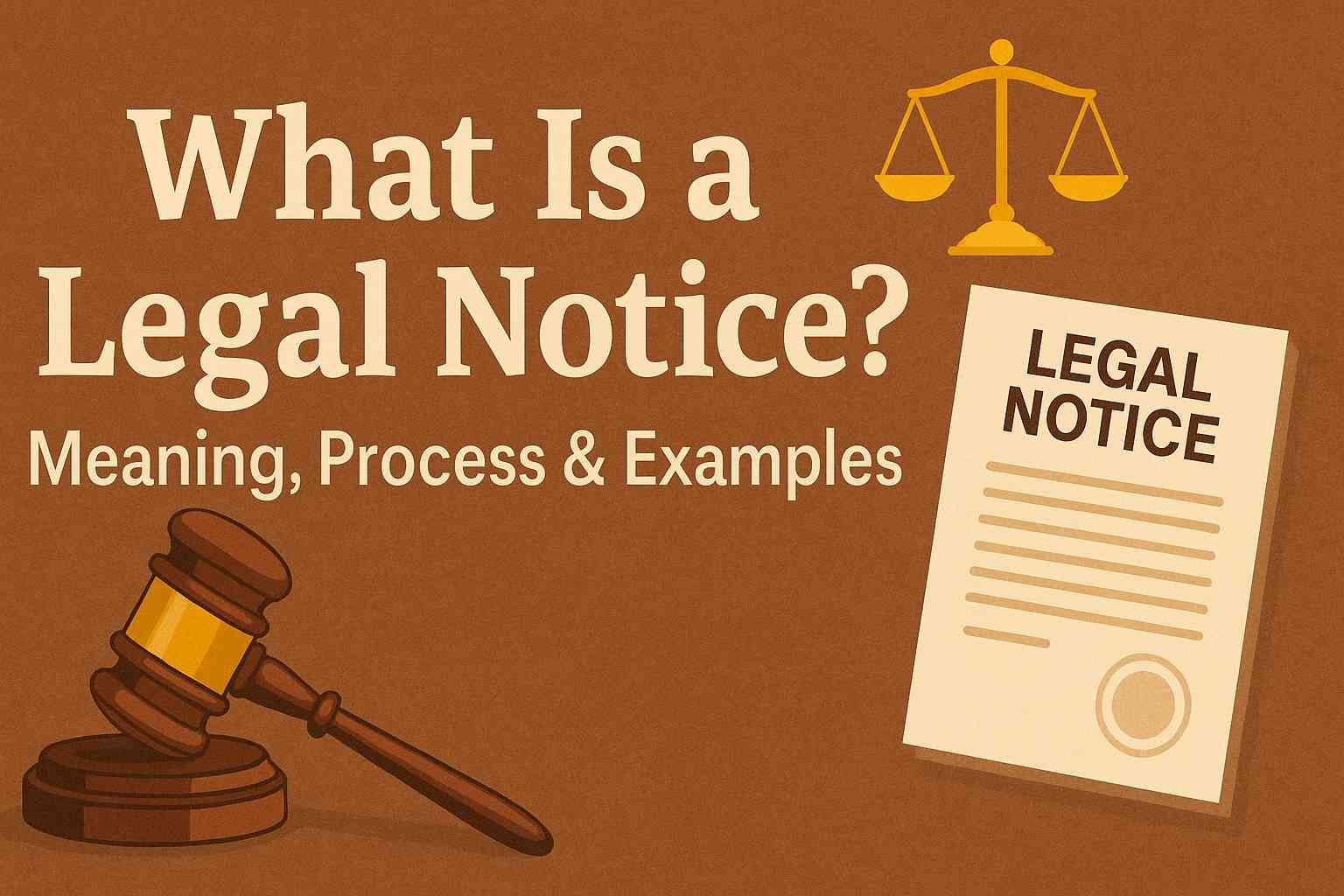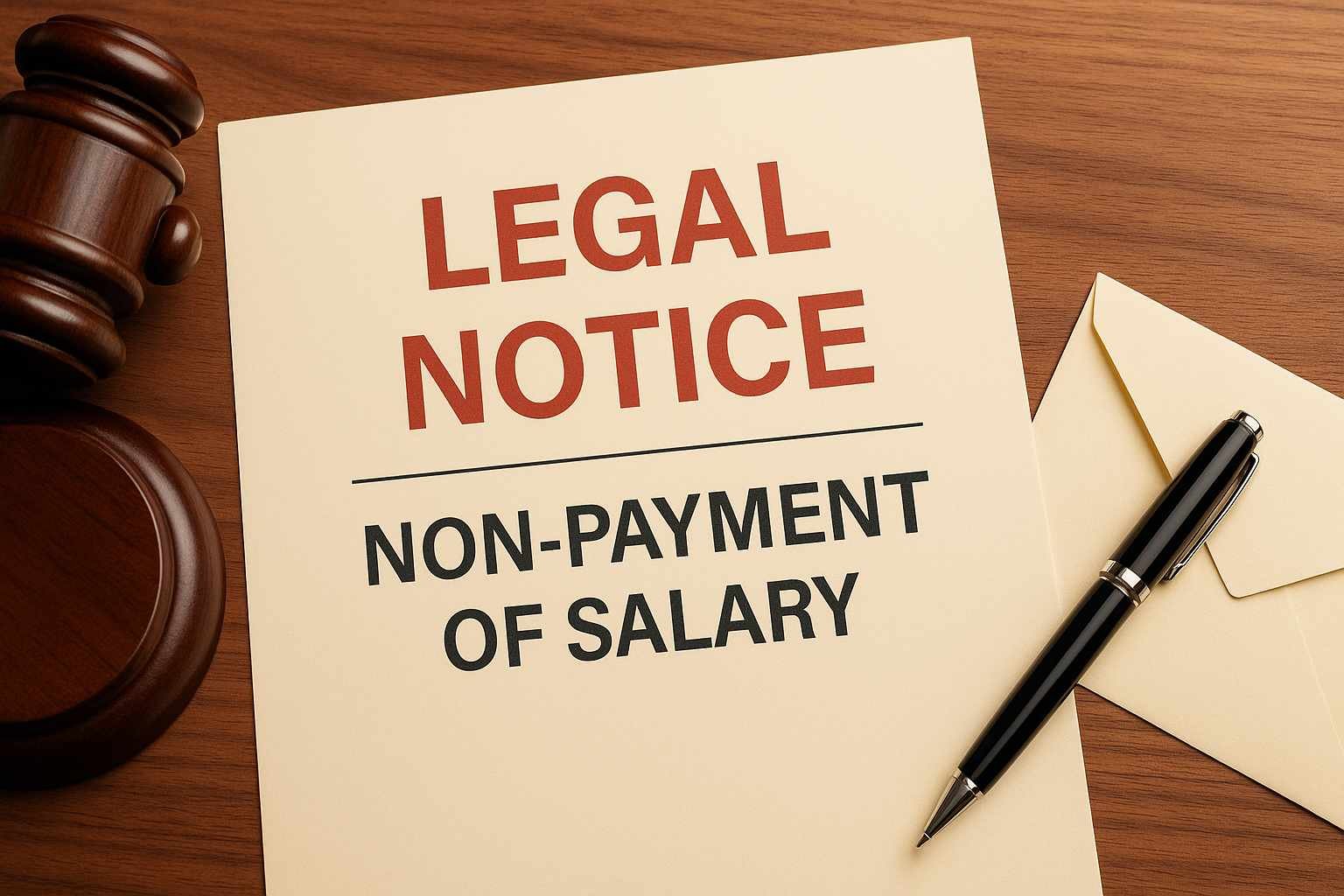On this page you will read detailed information about What Is a Legal Notice.
In day-to-day life, disputes are inevitable. It could be a disagreement over property, delay in payment, breach of contract, or even issues within families. While many conflicts can be resolved through discussion, some require formal action. In the legal world, one of the first formal steps often taken is the issuance of a legal notice.
A legal notice is not just a piece of paper—it is a structured communication backed by law. It is the way one party warns or informs another that they intend to take legal action if the dispute is not resolved within a given time. Understanding what a legal notice is, its purpose, and its process can empower individuals and businesses to protect their rights effectively.
Definition of a Legal Notice
A legal notice is a formal written communication sent by one party to another, usually through an advocate, indicating grievances and demanding a specific action or remedy. It serves as an advance intimation before approaching a court.
In simple terms, it is a legal warning: “If you do not resolve this issue, I will be forced to seek help from the law.”
Purpose of a Legal Notice
The primary objectives of a legal notice are:
- Notification – It informs the other party about the problem and the sender’s intention to take legal action if the issue is not addressed.
- Opportunity to Settle – It gives the recipient a chance to resolve the matter without going to court.
- Evidence – If the case goes to court, the legal notice serves as proof that the sender attempted to settle the matter amicably first.
- Formality – It establishes seriousness in communication. Unlike casual messages or verbal complaints, a legal notice carries legal weight.
Common Situations Where Legal Notices Are Used
Legal notices can be sent in various circumstances. Some common examples include:
- Property Disputes
- Encroachment by neighbors
- Disputes between landlords and tenants (non-payment of rent, eviction, maintenance issues)
- Employment Issues
- Wrongful termination
- Non-payment of salary or dues
- Breach of employment contract
- Consumer Complaints
- Delivery of defective goods
- Deficiency in service (for example, issues with builders, banks, or telecom companies)
- Financial Matters
- Recovery of unpaid loans
- Dishonor of cheques (covered under Section 138 of the Negotiable Instruments Act)
- Family Disputes
- Divorce and maintenance matters
- Child custody disagreements
Legal Framework Governing Legal Notices in India
While there is no single law exclusively governing legal notices, different statutes make them mandatory or common practice in certain cases.
- Code of Civil Procedure (CPC), 1908: Under Section 80, serving a legal notice is mandatory before filing a suit against the Government or a public officer.
- Negotiable Instruments Act, 1881: In cheque bounce cases, a legal notice must be sent within 30 days of dishonor.
- Consumer Protection Act, 2019: Consumers often send legal notices before filing complaints in consumer courts.
- Contract Act, 1872: Notices are sent to enforce or terminate contracts.
Thus, while not always mandatory, legal notices are widely recognized and practiced in almost all legal proceedings.
Who Can Send a Legal Notice?
- Any individual who feels their rights are violated.
- Companies or businesses in case of contractual or commercial disputes.
- Through a lawyer/advocate, which is most common, since lawyers know how to draft notices properly.
A person can draft and send a notice themselves, but hiring a lawyer is advised for clarity, precision, and legal backing.
Format and Contents of a Legal Notice
While formats may vary, a standard legal notice usually contains:
- Sender’s Details – Name, address, and contact information.
- Recipient’s Details – Name and address of the person or entity being addressed.
- Facts of the Case – A clear explanation of the events leading to the dispute.
- Legal Grounds – The laws or contractual obligations that support the sender’s claim.
- Relief/Demand – What the sender wants (e.g., payment of money, stopping certain activity, delivery of goods).
- Timeline – A specified period (usually 15–30 days) for the recipient to act before legal proceedings begin.
- Signature of Advocate – Most notices carry the signature and stamp of the lawyer who drafted it.
Process of Sending a Legal Notice
- Consult a Lawyer – Share all relevant facts and documents.
- Drafting the Notice – The lawyer carefully drafts the notice in precise legal language.
- Sending the Notice – It is usually sent through registered post, courier, or sometimes email (depending on legal acceptance).
- Acknowledgment – Proof of delivery (postal receipt, tracking details) is kept as evidence.
- Recipient’s Response – The recipient may comply, negotiate, or ignore the notice.
If the recipient ignores the notice, the sender can proceed to file a lawsuit.
Importance of a Legal Notice
- Encourages Settlement: Many disputes are resolved after a notice, without going to court.
- Saves Time and Money: Litigation is costly and time-consuming. Notices provide an alternative.
- Protects Rights: It establishes that the sender took formal steps to protect their interests.
- Foundation for Court Cases: Judges often ask whether a notice was issued before filing a case.
Limitations of a Legal Notice
While legal notices are powerful, they also have limitations:
- They don’t guarantee compliance—recipients may ignore them.
- Drafting errors may weaken the case.
- Some people may react defensively, making resolution harder.
- Deadlines in notices must align with legal requirements; otherwise, cases may get dismissed.
In the previous post, we had shared information about Wills vs. Trusts: Navigating the Estate Planning Landscape, so read that post also.
What to Do After Sending or Receiving a Legal Notice
- If You Sent a Notice: Track delivery and wait for the response. If there’s no reply or resolution, discuss next steps with your lawyer.
- If You Receive a Notice: Do not panic. Consult a lawyer, respond within the given time, and explore settlement options if possible. Ignoring a notice can harm your defense later.
Real-Life Example
Imagine a landlord whose tenant has not paid rent for six months. The landlord, through a lawyer, sends a legal notice demanding payment within 15 days, failing which eviction proceedings will begin.
Two outcomes are possible:
- The tenant pays or vacates peacefully, avoiding litigation.
- The tenant ignores the notice, forcing the landlord to approach the court.
In both cases, the notice is crucial—it either resolves the issue or strengthens the landlord’s case in court.
Conclusion
A legal notice is often the first step toward justice. It gives both parties a chance to resolve disputes without lengthy court battles, while also protecting legal rights. Whether it’s a property issue, financial dispute, or family matter, a well-drafted legal notice carries weight and can pave the way for resolution.
If you ever find yourself in conflict, consulting a lawyer and sending a proper legal notice may save you time, money, and stress. Remember, it is not just a warning—it is a vital tool in ensuring fairness and accountability in society.
Disclaimer
The information and services on this website are not intended to and shall not be used as legal advice. You should consult a Legal Professional for any legal or solicited advice. While we have good faith and our own independent research to every information listed on the website and do our best to ensure that the data provided is accurate. However, we do not guarantee the information provided is accurate and make no representation or warranty of any kind, express or implied, regarding the accuracy, adequacy, validity, reliability, availability, or completeness of any information on the Site. UNDER NO CIRCUMSTANCES SHALL WE HAVE ANY LIABILITY TO YOU FOR ANY LOSS OR DAMAGE OF ANY KIND INCURRED AS A RESULT OR RELIANCE ON ANY INFORMATION PROVIDED ON THE SITE. YOUR USE OF THE SITE AND YOUR RELIANCE ON ANY INFORMATION ON THE SITE IS SOLELY AT YOUR OWN RISK. Comments on this website are the sole responsibility of their writers so the accuracy, completeness, veracity, honesty, factuality and politeness of comments are not guaranteed.
So friends, today we talked about What Is a Legal Notice, hope you liked our post.
If you liked the information about What Is a Legal Notice, then definitely share this article with your friends.
Knowing about laws can make you feel super smart ! If you find value in the content you may consider joining our not for profit Legal Community ! You can ask unlimited questions on WhatsApp and get answers. You can DM or send your name & number to 8208309918 on WhatsApp









